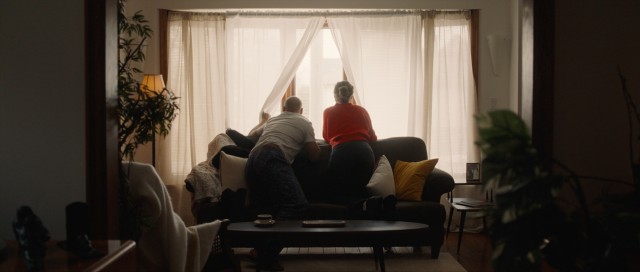Melina and Daniel live peacefully in her father’s home, the house she grew up in. But what used to be a Black neighborhood is slowly changing, as the original residents are selling-up and white people are move in. As Melina watches it all unfold, she can’t help but feel a looming threat! In Diaspora, writer/director Tyler Mckenzie Evans crafts a sharp, enthralling and effective metaphor of gentrification, using a combination of genre and satire to cleverly dramatize and amplify the effects of the housing issue from Melina’s perspective.
“My imagination always came up with the most horrific possible theories of what happened to my neighbors”
Gentrification is all around us, so it came as no surprise when Mckenzie Evans told us that he drew the inspiration from his own childhood, witnessing first hand the changes in his own predominately black and brown neighborhood. His tonal choice also came from his adolescence, as he explains: “being an avid reader of sci fi and horror books & movies, my imagination always came up with the most horrific possible theories of what happened to my neighbors”. Conflating that with the deeper and historical ramifications of gentrification led him to penning the screenplay for Diaspora.
Striking the right balance between satire and thriller is what makes the film so engaging, both as a genre narrative and as social commentary, which is ultimately my favorite subgenre of “midnight” films. The screenplay is sharp and witty, the subtlety ensuring things never become farcical, and Mckenzie Evans, with his team, crafted an unsettling atmosphere that holds the audience’s attention as we increasingly fear for Melina, and wonder if she is being paranoid or if something really is going on.

Melina and Daniel watch the changes to their neighborhood from the “safety” of their home.
As the film goes on, the contrast between the warmth we get from Melina and Daniel in their home, and the disconnect and coldness she feels outside escalates and becomes palpable through the screen. That tension is effectively created by the cinematography of Evan Ciniello, the editing of Jordan Hayles, the sound design by Ryan Altschuler & Chris Russell and the score by Daniela Pinto, which cleverly combine to slowly isolate Melina in her once familiar surroundings. As they come together to immerse us in that weird confusing vibe, the audience is left wondering if Melina is losing it or if she’s actually in danger.
Performances were also paramount in bringing Mckenzie Evans’ vision to the screen. Every single white character understood the assignment, the new home owners have that Stepford Wives vibe, while the people in the store carry an incredibly obnoxious demeanor. But of course, it is Cara Ricketts as Melina that makes the film so riveting. Instantly likable, we experience the film through her eyes as she takes us on a journey, carrying the depth of the screenplay with nuance and authenticity, without needing any dialogue.
Diaspora had its World Premiere at the 2022 edition of TIFF and went on to be selected at multiple festivals including Palm Springs and Overlook, ahead of its online debut as a Vimeo Staff Pick. Having attended the TIFF Filmmaker Lab in 2023, Mckenzie Evans is currently developing his first feature film.

 Céline Roustan
Céline Roustan